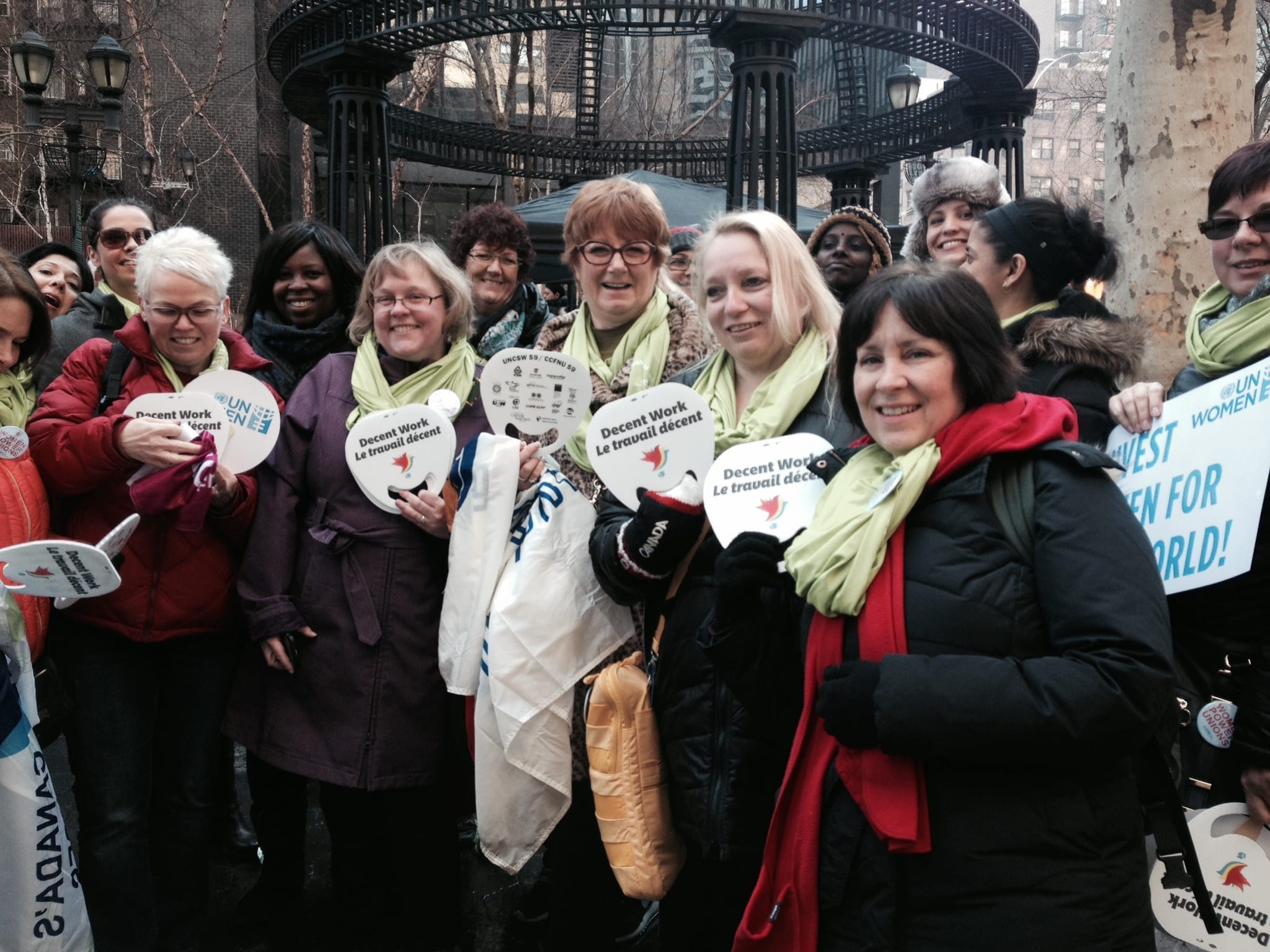
Mar 10, 2015
As more than 8,500 union members and other civil society activists gather at the United Nations in New York for the Commission on the Status of Women meeting, new research shows women have made some gains in the two decades since the landmark global meeting on women in Beijing but continue to suffer from economic insecurity and widespread discrimination and inequality in the workplace.
Fewer women are in the workforce today, according to a report by the International Labor Organization (ILO). In 1995, 52 percent of women and 80 percent of men were in the workforce, the ILO report finds. Today the participation rate for women is 50 percent, compared to 77 percent for men, reflecting in part the effects of the global recession.
Further, ILO research shows that women continue to be overrepresented in low-wage jobs that offer little security and few, if any, benefits. Women are paid 77 cents for every dollar a man makes—a rate that means women will not achieve pay equity with men before 2086. Women also work many hours without pay, a point made by an interactive, online report produced by the Bill & Melinda Gates Foundation, Clinton Foundation and Economist Intelligence Unit.
Unions are sponsoring several workshops and events during the CSW meetings, including a March 11 panel discussion, “Women’s Economic Empowerment and Labor Rights: Beijing +20 and Beyond.” Sponsored in part by the Solidarity Center, the panel will discuss how working women are fighting for fair wages and working conditions, equal job opportunities, freedom from sexual harassment and other forms of gender-based violence. Panelists include AFL-CIO International Department Director Cathy Feingold, Bangladesh garment worker activist Kalpona Akter and Elizabeth Tang, general secretary of the International Domestic Workers Federation (IDWF).
This year’s CSW meeting marks 20 years since the fourth women’s world conference in Beijing, when 189 governments identified and signed an agreement to improve 12 areas key to empowering women, including “the persistent and increasing burden of poverty on women.” During the next two weeks, CSW participants will review progress made in implementing the Beijing recommendations. Some 164 countries conducted national reviews of the status of women, and the CSW will review these reports, along with contributions from civil society.
“Governments acknowledge that women’s labor sustains families and nations,” says Lisa McGowan, Solidarity Center senior specialist for gender equality. “It is time that governments step up and devote the full political commitment and resources needed to sustain women, and ensure their labor and human rights.”
Established in 1946, the CSW is the principal global intergovernmental body exclusively dedicated to the promotion of gender equality and the empowerment of women
The UN yesterday approved a political declaration on the status of women and girls. Union activists and women’s and human rights groups say that the negotiations leading up to the adoption of the Political Declaration at UNCSW59 were held in advance, and consultation with civil society was kept to a minimum. As a result, the content of the declaration is not as strong and forward-looking as it could have been.
The change in process has been denounced by more than 1,000 organizations, including Public Services International (PSI), Education International (EI), the International Trade Union Confederation (ITUC) and the Canadian Labour Congress. Historically, the CSW has adopted declarations or “agreed conclusions” after a two-week session that includes robust civil society participation.
Other trade union events during the CSW include a discussion on organizing migrant women and decent work for domestic workers, and an event on “Women and Sustainable Economy from a Human Rights Perspective.” More events here.
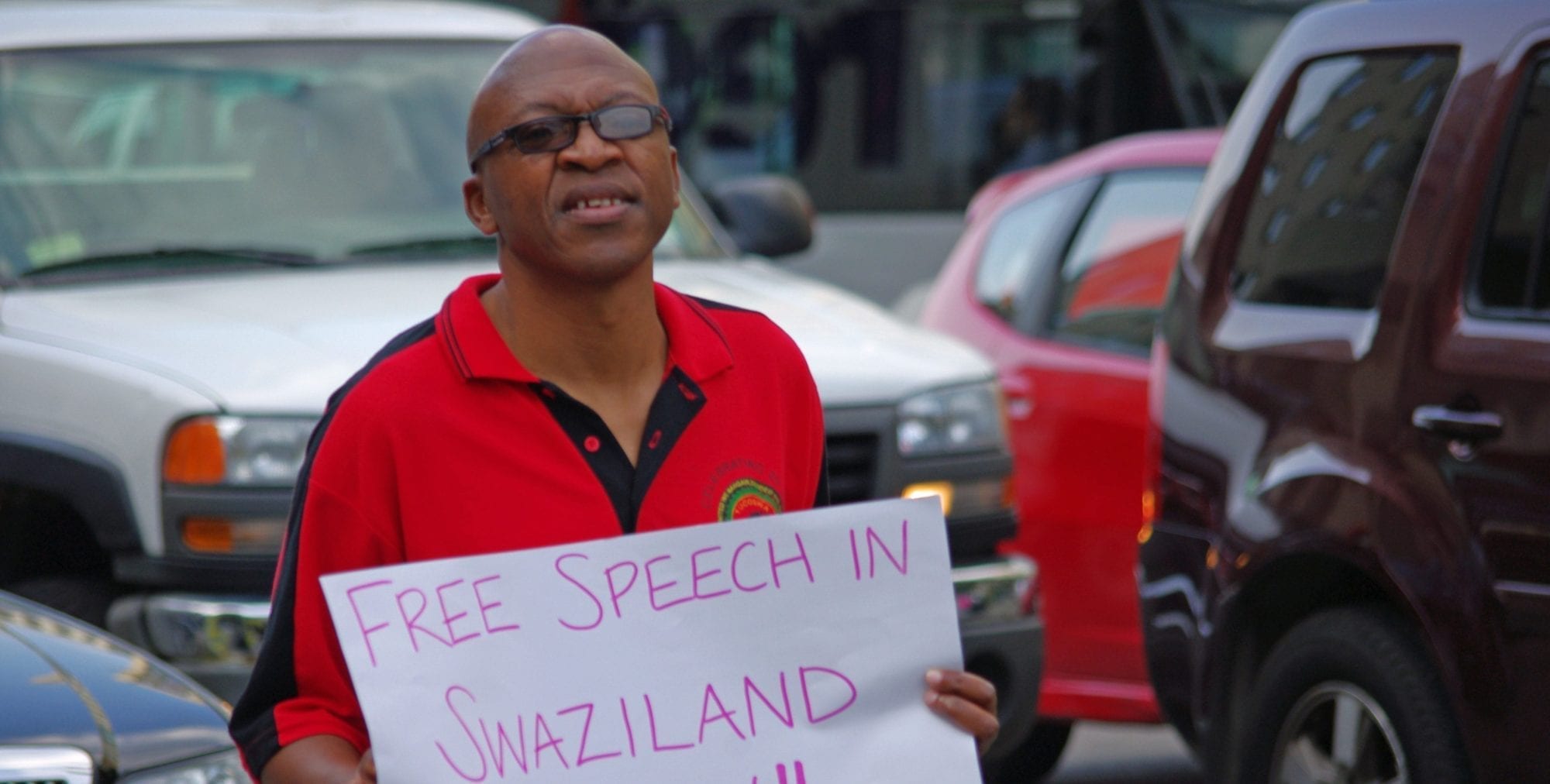
Mar 3, 2015
Accusing workers of discussing democracy, Swazi police broke up a national union meeting over the weekend in Manzini, according to Trade Union Congress of Swaziland (TUCOSWA) Secretary-General Vincent Ncongwane.
“The police said they would crush our meeting if we do not remove any discussion on multiparty democracy because according to the police, and their supervisors, that is not a workers’ agenda,” Ncongwane told Radio France Internationale. “And we said we are not going to remove that.”
Ncongwane said more than 100 police were at the site, and they erected roadblocks to prevent TUCOSWA members from entering the building. When union leaders cited the country’s constitution as allowing freedom of assembly, the police “said to us we are not going to be bothered about us quoting sections of the law,” Ncongwane recounted. “They are going to be interested in applying their discretion.”
The police action is the latest move against worker and human rights in Swaziland. Swaziland authorities continue their nearly three-year refusal to grant legal registration to TUCOSWA, despite the federation making another application in December 2014 under the country’s recently amended Industrial Relations Act. In August 2014, some in the Swazi government falsely accused Ncongwane and human rights lawyer Sipho Gumedze of taking a stand against trade benefits for Swaziland when they were in Washington, D.C., to attend the U.S. Africa Leaders Summit Civil Society Forum.
Earlier in June 2014 the U.S. took the rare step of suspending African Growth and Opportunity Act (AGOA) trade benefits for Swaziland, citing the Swazi government’s systematic violations of fundamental worker rights, including refusal to legally recognize TUCOSWA. Swaziland’s trade unions support AGOA, but maintain that the country must meet benchmarks of the agreement, which include respecting human rights and labor rights.
The 2014 U.S. State Department human rights report cited serious human rights violations in Swaziland, including arbitrary or unlawful killings by the government or its agents; severely restricted freedom of assembly, including violence against protestors; jailing of trade union leaders; the deregistration of TUCOSWA and the banning of strikes.
AGOA had been on the union’s meeting agenda. Garment workers, 90 percent of whom are women, have been especially hard hit. Ncongwane noted that the loss of AGOA has cost many jobs, with 2,000 garment workers already laid off. “We think that there’s going to be a flood of workers that are going to lose jobs just because of the loss of AGOA.”
In addition to non-registration of TUCOSWA and AGOA, trade union leaders also had planned to discuss the increasing casualization of labor, in which more and more workers getting hired on three month-contracts that provide no job stability or living wages. Ncongwane said these issues will be on the agenda for the union’s next meeting, March 14, a date that coincides with the TUCOSWA’s creation in 2012.

Feb 20, 2015
Leaders of the Bahrain Teachers Association were awarded the 2015 Arthur Svensson Prize for Trade Union Rights this week. The international honor recognizes Mahdi Abu Dheeb and Jalila al-Salman for “their encouragement of strike actions among teachers despite the personal risks they faced, including imprisonment and torture.”
Abu Dheeb, association president, was arrested in 2011 and sentenced to five years in prison. Charges against him included calling for a teachers’ strike. His health is deteriorating, and he is not receiving essential medical aid, according to the foundation.
Al-Salman, now acting union president, was arrested three times for exercising her right to freedom of assembly, for demanding reforms in Bahrain’s educational system and for protesting the killing and suppression of protesters, many of whom were students. Since her release from prison in November 2012, she has been banned from employment and her freedom of speech is restricted.
The Svensson Prize, established by the Norwegian union, Industri Energi, in 2010, is awarded annually to a person or organization that has worked predominately to promote trade union rights and/or strengthen trade union organizations. The announcement occurred as activists and unions around the world participated in a global day of action to support the right to strike.
Napoléon Gómez Urrutia, general secretary of Los Mineros, the National Miners’ and Metalworkers’ Union of Mexico (SNTMMSRM) received the prize in 2014, and Valentin Urusov, the Russian electrician and trade unionist unjustly imprisoned for years in a Siberian penal colony, received it in 2013.
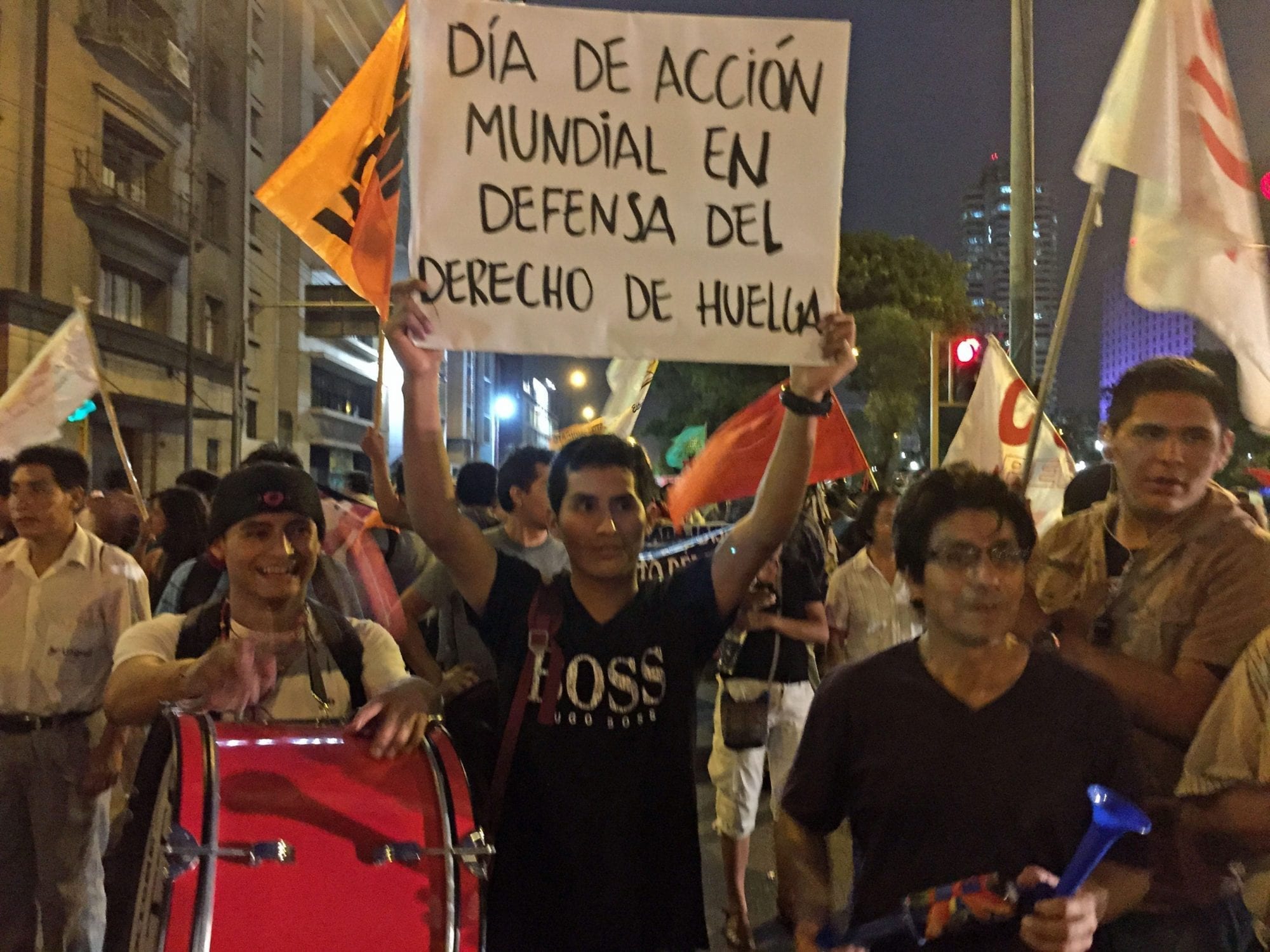
Feb 20, 2015
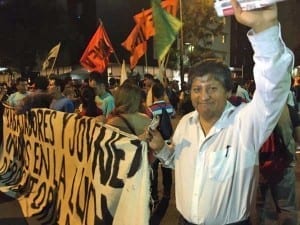
Thousands of workers marched in Lima on February 18, the global day of action for the right to strike. Credit: Solidarity Center
After lawmakers in Peru rammed through a law last November that reduced salaries and benefits for workers under age 25, they adjourned Congress and went to their home districts for the Christmas holiday, likely thinking the matter was over.
Tens of thousands of young workers thought otherwise.
“Students came together to organize protests, organize meetings with different sectors to fight the ‘reform,’” says Paola Aliaga, international relations secretary for the Autonomous Confederation of Peruvian Workers.
The unprecedented mobilization, in which up to 30,000 young workers and their allies marched in a series of protests, resulted in another unprecedented action: Lawmakers returned to session in January and immediately repealed the law.
“We hadn’t seen this turnout for many years. It was a win for all the sectors who were able to pull together,” according to Aliaga, speaking through an interpreter. Aliaga traveled to the United States last week and discussed the young workers’ campaign at the Solidarity Center in Washington, D.C.
Union members joined the protests, and workers of all ages understood that the creation of a two-tiered labor law system would be detrimental for everyone. The surge of activism by young workers is “new oxygen for the older folks in the movement,” says Aliaga.
Workers already are building on the momentum: On February 18, the global day of action for the right to strike day, thousands of workers and youth marched to Confiep, Peru’s chamber of commerce, to support the right to strike and call for a repeal of a mass layoff law and other recent anti-worker legislation.
Among those leading the protests last November were young worker activists from the textile and apparel, export-oriented agriculture and mining sectors—among the most vulnerable under the new law. They had plenty of support: A poll this year showed only one-fifth of Peruvians backed the law. Young workers protested at companies where employers supported the law, marched through Lima to Congress and woke up complacent lawmakers to the realities young workers face trying to make a living.
Peru President Ollanta Humala backed the bill and sought to confuse protesters about the date lawmakers would return to the capital, knowing they planned to rally when Congress opened the session, says Aliaga. Despite military presence at the protests and the detention of student activists, young workers remained steadfast in taking to the streets to peacefully voice their concerns.
“The role of the Solidarity Center in the garment sector has been key (to helping young workers understand their rights under Peruvian labor law),” says Aliaga. The Solidarity Center, with support from the U.S. Department of Labor, works closely with young Peruvian worker activists to help them analyze their labor rights; develop leadership, negotiating and organizing skills; and learn to advocate for their issues.
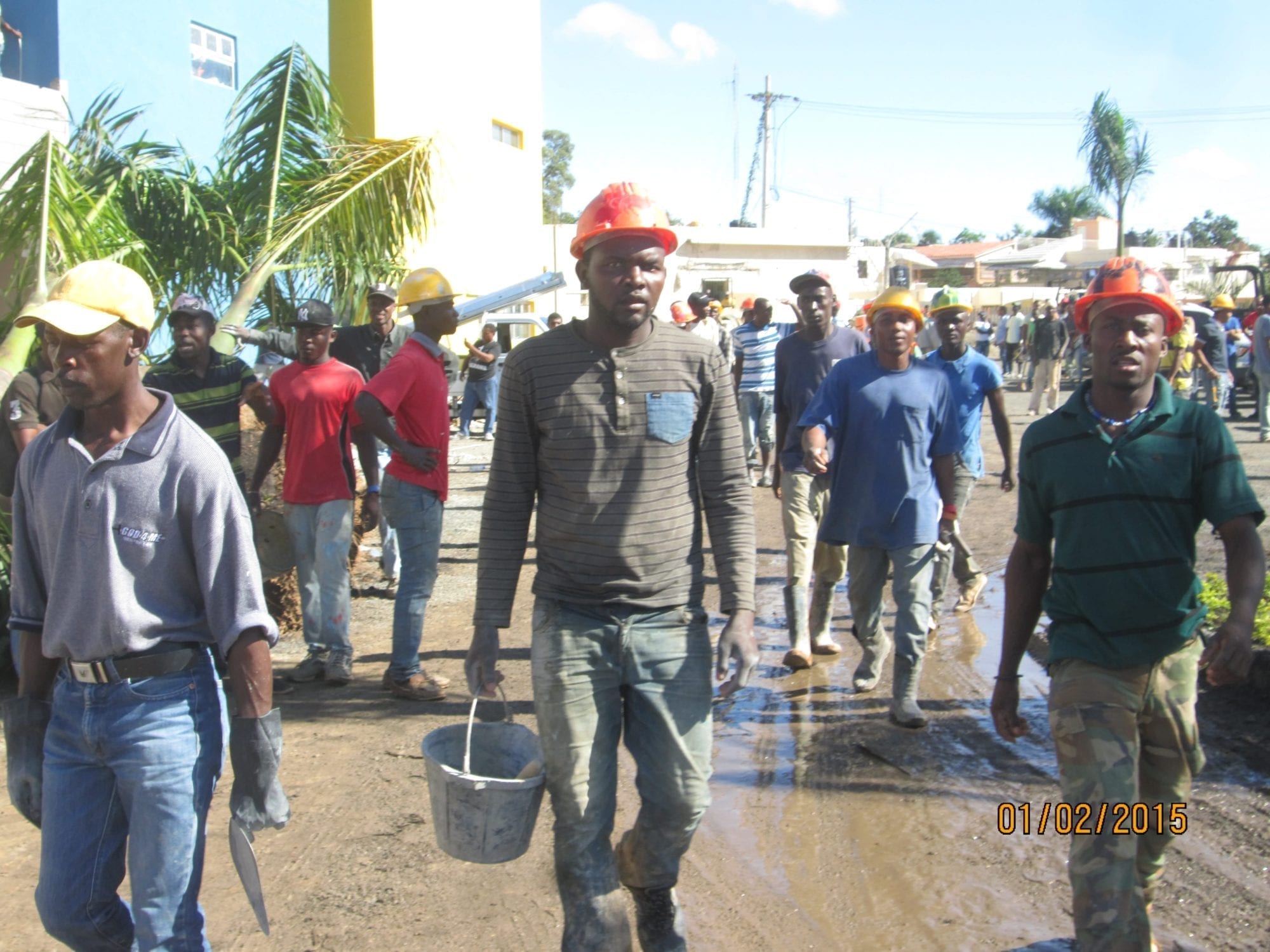
Feb 13, 2015

One of the five Haitian workers shot at a Dominican Republic construction site shows his wounds.
Five Haitian construction workers in the Dominican Republic were shot allegedly for asking for unpaid wages, according to press reports. In addition, an eyewitness told Solidarity Center staff in Santo Domingo, the capital, that on February 2, a sergeant of the National Army fired upon and wounded the five workers, who were not taken to a hospital until a delegation from the Haitian Embassy arrived.
The witness, who provided photos of the incident and spoke with Solidarity Center staff on February 10, claimed he spoke with one of the soldiers involved, and the soldier said he was paid by the construction engineer to prevent the workers from entering the construction site and to fire on the workers.
The workers had been working on the construction site of the hospital Dario Contreras.
A September 2013 court ruling targeted migrants in the Dominican Republic, revoking the citizenship of individuals born in the country since 1929 who could not prove their parents’ regular migration status.
On February 2, the deadline expired for Dominicans born to undocumented parents to apply for migrant permits, leaving thousands stateless. The process for documentation was rife with irregularities, making it difficult for anyone to receive official status.







